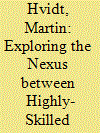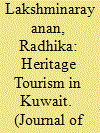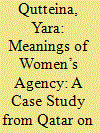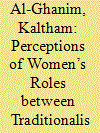|
|
|
Sort Order |
|
|
|
Items / Page
|
|
|
|
|
|
|
| Srl | Item |
| 1 |
ID:
169446


|
|
|
|
|
| Summary/Abstract |
This article explores the nexus between immigration of highly-skilled persons and economic growth in the Arab Gulf states, until now a significantly understudied topic. It is argued that long-term growth primarily stems from technological progress and the article conducts a qualitative analysis of the degree to which the group of highly skilled migrants contributes to technological progress. The paper focusses on the United Arab Emirates (UAE) but reflects general issues pertaining to the Arab Gulf states. It concludes that the policy framework that manages the migration system, the so-called Kafala (sponsorship) system, indeed has positive effects, namely that it ensures that all migrants are in employment and the skills of the migrants complement rather than overlap with the skills of the locals. However, asymmetric power balance between sponsor and migrant, the built-in inflexibility in relation to job mobility, and the lack of a broader sense of inclusion in the hosting country all diminish the contribution of the highly-skilled migrants to these economies. A culture of transience prevails which leads to short term thinking, less innovation and less likelihood of entrepreneurship. Finally, the article finds that due to demographic realities, lack of incentives for the migrants to pursue knowledge transfer and the general educational level in society, transfer of technology most likely takes place from one migrant to the next, thereby bypassing the local population.
|
|
|
|
|
|
|
|
|
|
|
|
|
|
|
|
| 2 |
ID:
169447


|
|
|
|
|
| Summary/Abstract |
Recent volatility in oil markets and the economic constraints of a budget deficit are compelling “rentier” states like Kuwait to seek various avenues for economic diversification. This article suggests that promoting heritage tourism could potentially transform the economy and propel tourism growth overall. It seeks to identify the prospects for heritage tourism development through an exploration of the tangible and intangible heritage of Kuwait. The paper provides an insight into challenges and constraints facing heritage tourism development in Kuwait including the need for training, education, image branding and marketing. Finally it suggests a framework for sustainable heritage tourism. Primary data was collected through field work in heritage institutions and museums and informal interviews with staff and visitors, and complemented by institutional brochures, official websites, newspaper reports, tourist information and government databases.
|
|
|
|
|
|
|
|
|
|
|
|
|
|
|
|
| 3 |
ID:
169444


|
|
|
|
|
| Summary/Abstract |
The measurement of women’s agency poses numerous challenges, including multi-dimensionality and context-specificity. This challenge is especially large for non-Western contexts that adapt measurement instruments without rigorous testing and comprehensive understanding of construct meanings in place. In this paper, we present a case study from Qatar where we investigate the face validity, comprehension and functionality of women’s agency scale items. Cognitive interviews were conducted with twenty-four women to capture their interpretations of decision-making, freedom-of-movement, and gender attitudes scale items. The majority of women originally reported that they made their own decisions; yet, further probing revealed otherwise. While women seemed to understand, as intended, the freedom-of-movement item, the items measuring gender attitudes were generally reflective of broader local societal norms rather than the women’s own opinions. This research highlights the need for deeper exploration into women’s understanding of an agency scale before its use in a new context.
|
|
|
|
|
|
|
|
|
|
|
|
|
|
|
|
| 4 |
ID:
169442


|
|
|
|
|
| Summary/Abstract |
No state in the Gulf region currently enjoys stable relations with the Islamic Republic of Iran except for the Sultanate of Oman, and Oman is the only Gulf state to have maintained friendly relations with Iran since the 1970s. This raises the question about how Oman manages to maintain its relationship with Iran, which is considered a regional rival. This article analyzes Oman’s foreign policy approach to Iran, arguing that its strategy of hedging has been the main pattern and the ultimate reason for the sustenance of the relationship. Oman’s hedging strategy towards Iran is mostly driven by pragmatic incentives to preserve security and achieve political stability.
|
|
|
|
|
|
|
|
|
|
|
|
|
|
|
|
| 5 |
ID:
169445


|
|
|
|
|
| Summary/Abstract |
Women’s participation in public life in the Arabian Peninsula is affected by tradition and limits their opportunities for socio-economic development. This study focuses on the social structures that impose gender inequality. Through in-depth focus group discussions with groups of men and women in different age groups and including both working and non-working individuals, gender roles are examined and the view of the different groups of men and women in Qatar of the roles that women are supposed to play inside and outside the home. Although some changes are occurring due to modernization, including education and other government policies, they are proving relatively minor: obstacles include deep-rooted kinship structure and cultural elements that limit women’s participation in the public sphere.
|
|
|
|
|
|
|
|
|
|
|
|
|
|
|
|
| 6 |
ID:
169443


|
|
|
|
|
| Summary/Abstract |
Where does the UAE’s Federal National Council fit in the scholarship on comparative legislative studies? Is it a “transformative” and “active” assembly (i.e. it makes legislation and policy) or is it an “arena” and “reactive” assembly (i.e. it focuses on public debate and policy influence)? Constitutionally, the FNC is portrayed as one of the Arabian Gulf region’s weaker assemblies. This article challenges that assumption. An analysis of the FNC’s media coverage in two newspapers in 2011–15 shows that its members’ actions resulted in the body acquiring a more expansive role. Members went beyond their formal revising powers of bills to propose legislation and funding and challenge ministers. The analysis also identifies members’ subject priorities (i.e. the economy and social security) and backgrounds, including more media attention accorded to members from smaller/poorer emirates (i.e. not Dubai and Abu Dhabi) and little difference between those who were elected and appointed.
|
|
|
|
|
|
|
|
|
|
|
|
|
|
|
|
|
|
|
|
|